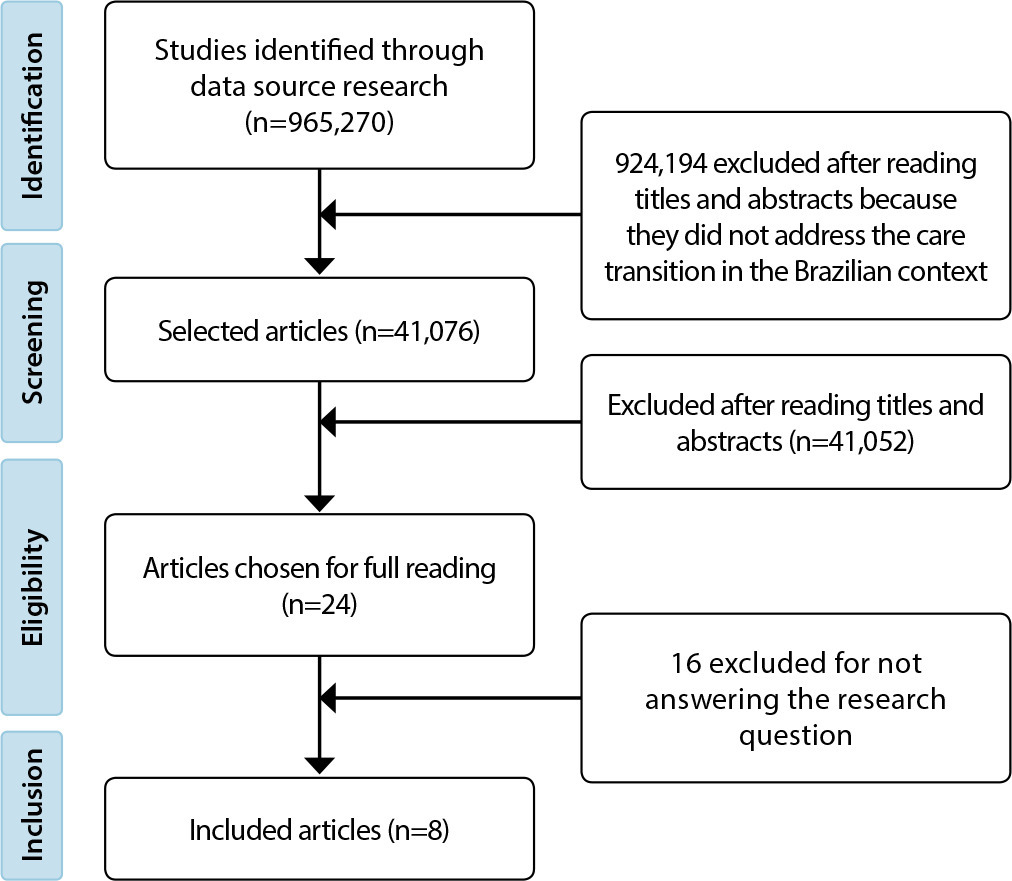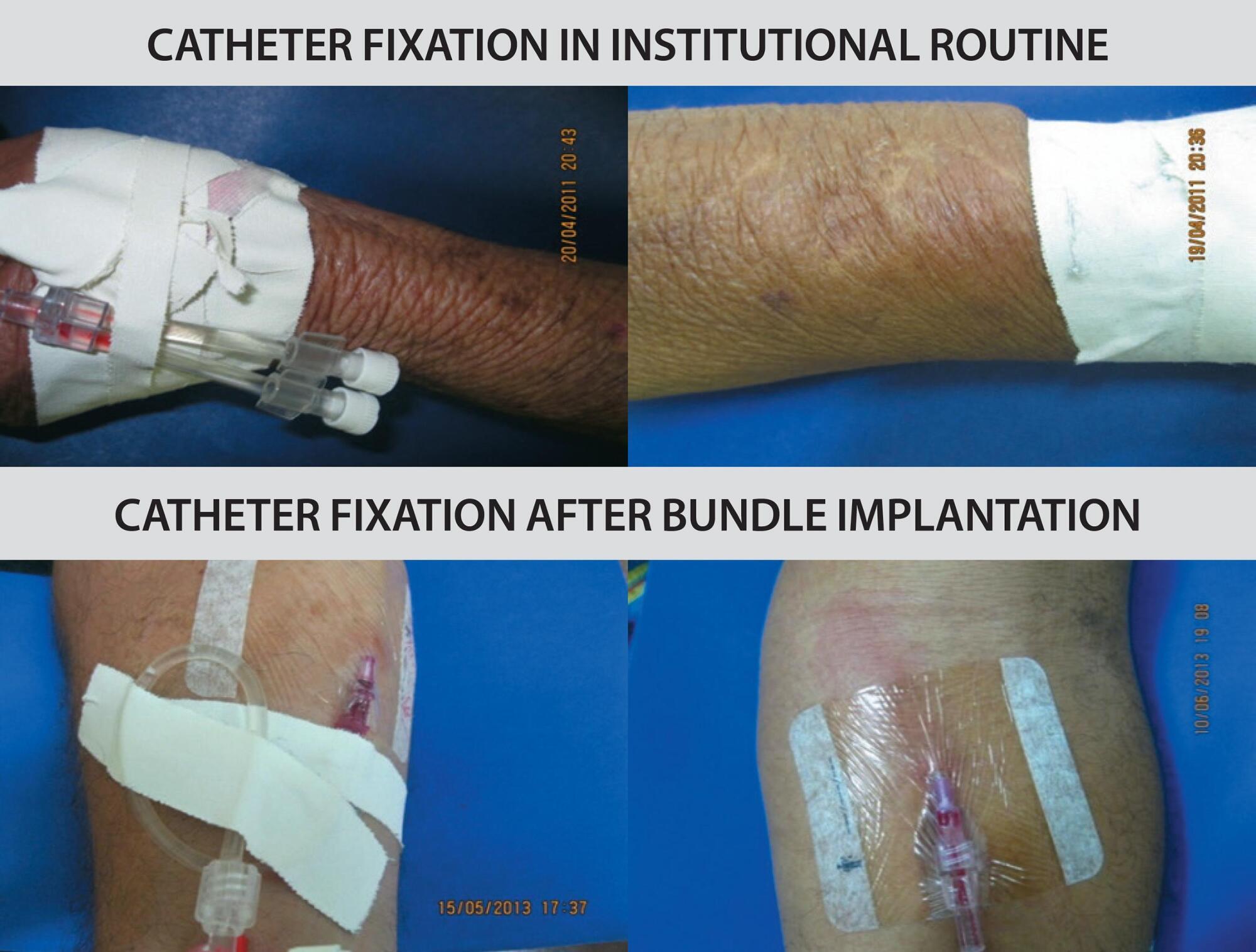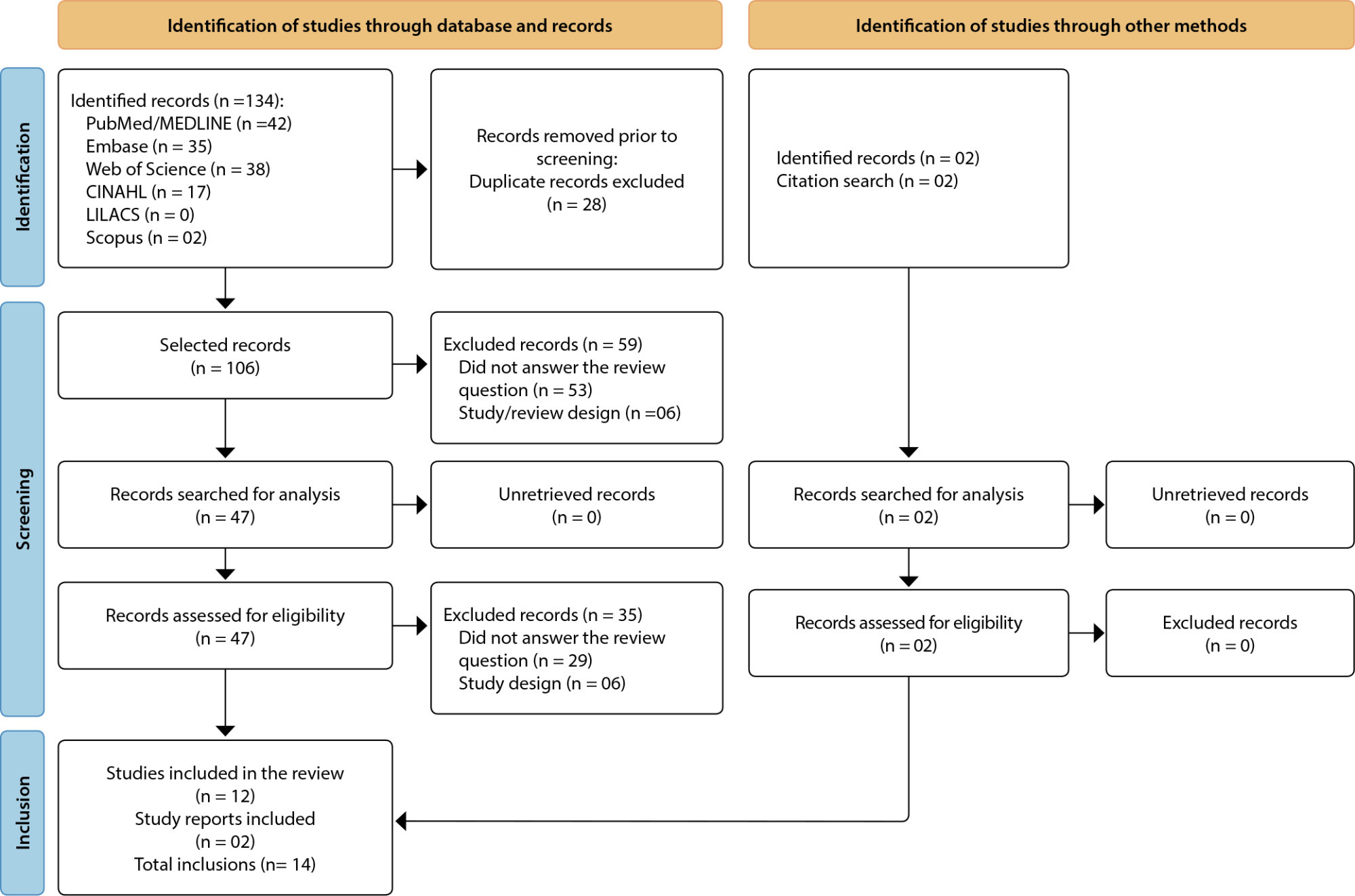-
Maternal Concerns in Home Care for the Premature Newborn: An Integrative Review
Revista Brasileira de Enfermagem. 2023;76(6):e20220769
Abstract
Maternal Concerns in Home Care for the Premature Newborn: An Integrative Review
Revista Brasileira de Enfermagem. 2023;76(6):e20220769
DOI 10.1590/0034-7167-2022-0769
Views0See moreABSTRACT
Objective:
To identify and analyze the scientific literature, both national and international, concerning the primary maternal concerns about caring for premature newborns at home.
Methods:
This integrative review is based on the guiding question: “What scientific publications from 2012 to 2021 address maternal concerns about the care of premature newborns at home?”. Searches were conducted in the electronic databases: Embase, Medline, Web of Science, Lilacs, Scielo, and Cochrane Library.
Results:
A total of 21 articles were identified. The qualitative analysis showed that maternal concerns pertained to breastfeeding, hygiene, sunbathing practices, managing infant colic, identifying signs, symptoms, and clinical changes, temperature control, and the third phase of the kangaroo method.
Conclusions:
Maternal uncertainties underscore the importance of enhancing strategies focused on supporting families and ensuring continued care for neonates at home.

-
ORIGINAL ARTICLE12-04-2023
Psychometric Properties of an Instrument for Assessing University Administrators’ Knowledge on Gender-Based Violence
Revista Brasileira de Enfermagem. 2023;76(6):e20220770
Abstract
ORIGINAL ARTICLEPsychometric Properties of an Instrument for Assessing University Administrators’ Knowledge on Gender-Based Violence
Revista Brasileira de Enfermagem. 2023;76(6):e20220770
DOI 10.1590/0034-7167-2022-0770
Views0ABSTRACT
Objective:
To evaluate the factorial structure of the instrument measuring university administrators’ knowledge of gender-based violence.
Methods:
This cross-sectional methodological study was conducted from August to November 2020 with 101 university administrators. Data on demographic and functional characteristics were collected, and the “QUEST VBG UNIV” instrument was applied. Descriptive analysis was performed, the structure of the questionnaire was assessed using exploratory factor analysis (EFA), and the stability of the factors was verified through ORION and FDI tests.
Results:
Of the original 38 items across the 4 sections of the questionnaire, 19 were retained within 2 factors, with appropriate factor loadings. Factor 1 had an explained variance of 15.69%, and Factor 2 had an explained variance of 9.10%. The reliability was deemed satisfactory (ORION > 0.900, FDI > 0.900).
Conclusions:
The questionnaire presented a valid and reliable factorial structure for measuring knowledge about gender-based violence, thereby representing a suitable option for situational assessments in universities.
Keywords:Factor AnalysisGender-Based ViolencePsychometricsStatisticalValidation StudyWorkplace violenceSee more
-
ORIGINAL ARTICLE12-04-2023
Hospital discharge planning in care transition of patients with chronic noncommunicable diseases
Revista Brasileira de Enfermagem. 2023;76(6):e20220772
Abstract
ORIGINAL ARTICLEHospital discharge planning in care transition of patients with chronic noncommunicable diseases
Revista Brasileira de Enfermagem. 2023;76(6):e20220772
DOI 10.1590/0034-7167-2022-0772
Views0ABSTRACT
Objective:
to analyze care transition in hospital discharge planning for patients with chronic noncommunicable diseases.
Method:
a qualitative study, based on the Care Transitions Intervention theoretical model, with four pillars of intervention, to ensure a safe transition. Twelve professionals participated in a public hospital in the countryside of São Paulo. Data were collected through observation, document analysis and semi-structured interviews.
Results:
there was a commitment of a multidisciplinary team to comprehensive care and involvement of family members in patient care. The documents facilitated communication between professionals and/or levels of care. However, the lack of time to prepare for discharge can lead to fragmented care, impairing communication and jeopardizing a safe transition.
Final considerations:
they were shown to be important elements in discharge planning composition, aiming to ensure a safe care transition, team participation with nurses as main actors, early discharge planning and family involvement.
Keywords:Continuity of Patient CareNurse's RolePatient DischargePatient-Centered CareProcess AssessmentTransitional CareSee more -
ORIGINAL ARTICLE12-04-2023
Meanings of nurses’ role in Child and Adolescent Psychosocial Care Centers
Revista Brasileira de Enfermagem. 2023;76(6):e20230124
Abstract
ORIGINAL ARTICLEMeanings of nurses’ role in Child and Adolescent Psychosocial Care Centers
Revista Brasileira de Enfermagem. 2023;76(6):e20230124
DOI 10.1590/0034-7167-2023-0124
Views0See moreABSTRACT
Objective:
to analyze the meaning attributed to nurses’ role in mental health care in Child and Adolescent Psychosocial Care Centers.
Methods:
qualitative research, anchored in the paradigm of complexity. Data collection was carried out through online semi-structured interviews with ten nurses from São Paulo, between March and September 2022, being analyzed thematically.
Results:
the diversity and specificity of a child and adolescent mental health clinic, with the need for expanded, territorial and intersectoral care, were unveiled in addition to a fragmented training in the area. There was a need for a deconstruction of being a nurse to make it possible to produce more inclusive and salutogenic practices.
Final considerations:
the need for training nurses with adequate knowledge and skills to care for the mental health of children, adolescents and their families is reinforced as well as permanent education of working teams.
-
Transition of Care for Individuals with Mental Disorders in Brazil: A Contextual Analysis
Revista Brasileira de Enfermagem. 2023;76(6):e20230063
Abstract
Transition of Care for Individuals with Mental Disorders in Brazil: A Contextual Analysis
Revista Brasileira de Enfermagem. 2023;76(6):e20230063
DOI 10.1590/0034-7167-2023-0063
Views0See moreABSTRACT
Objective:
To describe the contexts of care transition for individuals with mental disorders in the Brazilian setting.
Methods:
A contextual analysis was conducted through a scoping review. The search for studies was conducted in databases and thesis and dissertation portals, and the analysis was based on immediate, specific, general, and meta-contexts.
Results:
The sample, consisting of eight studies, indicated that the following factors are present in the contexts where care transition occurs: Peculiarities of care transition for individuals with mental disorders; Perspectives that can strengthen or weaken this transition; Approaches proposed in the past for the development of care transition; and Elements related to Brazilian legislation.
Final Considerations:
It is observed that the transition of care for individuals with mental disorders in Brazil takes place in various contexts of care levels. These variations present significant potentials and barriers in the care scenarios.

-
ORIGINAL ARTICLE12-04-2023
Effect of cardiovascular biofeedback on nursing staff stress: a randomized controlled clinical trial
Revista Brasileira de Enfermagem. 2023;76(6):e20230069
Abstract
ORIGINAL ARTICLEEffect of cardiovascular biofeedback on nursing staff stress: a randomized controlled clinical trial
Revista Brasileira de Enfermagem. 2023;76(6):e20230069
DOI 10.1590/0034-7167-2023-0069
Views0See moreABSTRACT
Objective:
to assess the effect of cardiovascular biofeedback on nursing staff stress when compared to an activity without self-monitoring.
Method:
a randomized controlled clinical trial, carried out with nursing professionals from a university hospital. The intervention group (n=58) performed cardiovascular biofeedback, and the control (n=57) performed an online puzzle without self-monitoring, totaling nine meetings over three weeks. The outcome was assessed using the Stress Symptoms and Work-Related Stress scales, and the biological marker heart rate variability. The generalized estimating equations method was used.
Results:
the intervention had no effect on self-reported instruments (p>0.050). However, there was an effect of time (p<0.050) on all heart rate variability indicators, demonstrating changes over the sessions.
Conclusion:
cardiovascular biofeedback showed promising results in the biological marker, suggesting that it can be used in nursing staff as a complementary therapy by promoting better autonomic nervous system regulation.

-
ERRATUM12-04-2023
ERRATUM
Revista Brasileira de Enfermagem. 2023;76(6):e2023n6e06
Abstract
ERRATUMERRATUM
Revista Brasileira de Enfermagem. 2023;76(6):e2023n6e06
DOI 10.1590/0034-7167.20237606e06
Views0In the article “Undergraduate nursing students’ knowledge and experience in infusion therapy and peripheral vascular acces”, with DOI number: , published in Revista Brasileira de Enfermagem, 2023;76(3): e20220219, authored:Where it read:[…]See more
-
ORIGINAL ARTICLE08-19-2019
Psychosocial risks related to the nurse in the psychiatric hospital and management strategies
Revista Brasileira de Enfermagem. 2019;72(4):834-840
Abstract
ORIGINAL ARTICLEPsychosocial risks related to the nurse in the psychiatric hospital and management strategies
Revista Brasileira de Enfermagem. 2019;72(4):834-840
DOI 10.1590/0034-7167-2017-0311
Views0See moreABSTRACT
Objective:
To characterize the presence of psychosocial risks related to the work of the nurse in a psychiatric hospital and the strategies for managing these risks.
Methods:
Qualitative, in which 25 nurses from a psychiatric hospital participated using semi-structured interviews from November 2014 to January 2015. Data analysis was performed using the thematic method.
Results:
The results showed psychosocial risks related to the work of psychiatric nurses, such as: insufficient academic training; lack of preparation and maintenance of equipment; poor relationship with colleagues; shortage of human resources and lack of capacity building; conflict between the demands of the home and work, as well as strategies for managing psychosocial risks such as family, cinema, music, reading, among others.
Final considerations:
This study should provoke the reflection of managers and future nurses regarding the working conditions in a psychiatric hospital and possible psychosocial risks to which they are exposed.
-
ORIGINAL ARTICLE06-01-2020
Structural and procedural conditions in National Immunization Program Information System establishment
Revista Brasileira de Enfermagem. 2020;73(4):e20180939
Abstract
ORIGINAL ARTICLEStructural and procedural conditions in National Immunization Program Information System establishment
Revista Brasileira de Enfermagem. 2020;73(4):e20180939
DOI 10.1590/0034-7167-2018-0939
Views0ABSTRACT
Objectives:
to analyze structural and process conditions in National Immunization Program Information System establishment.
Methods:
a cross-sectional study conducted in 307 vaccination rooms in the state of Minas Gerais in 2017. For data collection, a multidimensional questionnaire was used. Descriptive data analysis was performed.
Results:
vaccination rooms have basic inputs necessary for System establishment. The greatest problems relate to professional practice. Low enrollment of population, failures in the active search for absentees, vaccine scheduling and absence of reports to monitor vaccination coverage were identified. Training was considered insufficient and ineffective.
Conclusions:
Immunization Information System is an essential technological innovation for the management of immunization actions. However, the production of timely records and the use of information are still challenges. Investments in training are required to ensure System’s management and operationalization activities.
Keywords:Evaluation StudiesHealth Information SystemsImmunization ProgramsInformation TechnologyNursingSee more -
Trends in fertility rates, proportion of antenatal consultations and caesarean sections among Brazilian adolescents
Revista Brasileira de Enfermagem. 2021;74:e20200884
Abstract
Trends in fertility rates, proportion of antenatal consultations and caesarean sections among Brazilian adolescents
Revista Brasileira de Enfermagem. 2021;74:e20200884
DOI 10.1590/0034-7167-2020-0884
Views0ABSTRACT
Objective:
To analyze the temporal trends in the fertility rate, proportion of antenatal consultations and caesarean sections in Brazilian adolescents aged 15 to 19, between 2000 and 2015. Methods: The fertility rate, proportion of prenatal consultations and proportion of routes of birth were calculated using data from DATASUS. The trend analysis was performed using the Prais-Winsten regression model and the annual percentage change.
Results:
There was a trend of reduction of 3.5% per year in the fertility rate among adolescents (p<0.05), in addition to an increasing trend of 6% per year in the proportion of more than six antenatal consultations (p <0.0001) and an increasing trend of 6.8% per year in the proportion of caesarean sections (p<0.0001).
Conclusion:
Despite the decreasing trend in fertility rates among Brazilian adolescents, they remain high. Also noteworthy is the growing trend for caesarean sections, even with improved access to antenatal care.
Keywords:Birth RateCaesarean SectionDescriptors:Pregnancy in adolescencePrenatal CareTime Serie StudiesSee more
-
ORIGINAL ARTICLE10-21-2019
Nursing protocol in vascular trauma prevention: peripheral catheterization bundle in urgency
Revista Brasileira de Enfermagem. 2019;72(6):1512-1518
Abstract
ORIGINAL ARTICLENursing protocol in vascular trauma prevention: peripheral catheterization bundle in urgency
Revista Brasileira de Enfermagem. 2019;72(6):1512-1518
DOI 10.1590/0034-7167-2018-0457
Views0See moreABSTRACT
Objective:
to create, apply and analyze in clinical practice the effectiveness of a bundle to prevent peripheral vascular trauma to approach the peripheral venous puncture process.
Method:
action research with 435 adult participants in an emergency service from 2011 to 2013. Creation of the bundle for prevention of vascular trauma based on scientific evidence, ease of operation, observation and measurement with implantation through an educational intervention of the team of nursing. Effectiveness analyzed by descriptive and inferential statistics using chi-square. Consecutive sample with 95% confidence interval.
Results:
Five stages of the bundle were related to the catheter fixation, permanence and removal process. The incidence of vascular traumas due to vein punctures reduced by 46.41% after implantation of the bundle to prevent vascular trauma associated with emergency peripheral catheterization.
Conclusion:
The bundle in clinical practice reduced vascular traumas by venipuncture.

-
ORIGINAL ARTICLE09-21-2020
Autonomy in the reproductive health of quilombolas women and associated factors
Revista Brasileira de Enfermagem. 2020;73:e20190786
Abstract
ORIGINAL ARTICLEAutonomy in the reproductive health of quilombolas women and associated factors
Revista Brasileira de Enfermagem. 2020;73:e20190786
DOI 10.1590/0034-7167-2019-0786
Views0ABSTRACT
Objective:
Identify the level of reproductive autonomy of quilombola women and associate it with sociodemographic characteristics and aspects of sexual and reproductive health.
Methods:
Cross-sectional census study carried out in quilombola communities in a municipality in Bahia. Data was collected through questionnaires from the National Health Survey and the Reproductive Autonomy Scale, applied to quilombola women who agreed to participate. Descriptive statistics procedures were used and associations were made between reproductive autonomy scores and sociodemographic and reproductive characteristics.
Results:
The average total score for reproductive autonomy was 2.06. An association was found between the “decision-making” score and marital status. The score for “total reproductive autonomy” was associated with the use of contraceptive method.
Conclusion:
The reality of the study participants converges with the literature regarding the interference of sociodemographic and reproductive factors in the reproductive autonomy of black women.
Keywords:African Continental Ancestry GroupPersonal AutonomyReproductive HealthSocioeconomic FactorsWomenSee more -
ORIGINAL ARTICLE09-16-2019
Playful educational intervention with schoolchildren on intestinal parasitosis
Revista Brasileira de Enfermagem. 2019;72(5):1203-1210
Abstract
ORIGINAL ARTICLEPlayful educational intervention with schoolchildren on intestinal parasitosis
Revista Brasileira de Enfermagem. 2019;72(5):1203-1210
DOI 10.1590/0034-7167-2017-0551
Views0See moreABSTRACT
Objective:
To analyze the playful educational interventions in the knowledge of schoolchildren about intestinal parasitosis.
Method:
This is a quasi-experimental, non-randomized study, based on pre- and post-intervention, conducted in a public elementary school in a peripheric neighborhood in the city of Ribeirão Preto (SP). The study population consisted of 101 students enrolled in the 5th and 6th grade. For comparison, we used the generalized version of the McNemar chi-squared test.
Results:
Of the 101 schoolchildren who participated in the study, 48 (47.5%) were female and 53 (52.5%) were male, aged from 9 to 14 years. Students’ knowledge on intestinal parasitic infections has increased significantly after the playful educational intervention.
Conclusion:
Playful educational interventions are an excellent didactical resource in the teaching-learning process of schoolchildren.
-
ORIGINAL ARTICLE02-10-2020
Group Brief Intervention: effectiveness in motivation to change alcohol intake
Revista Brasileira de Enfermagem. 2020;73(1):e20180138
Abstract
ORIGINAL ARTICLEGroup Brief Intervention: effectiveness in motivation to change alcohol intake
Revista Brasileira de Enfermagem. 2020;73(1):e20180138
DOI 10.1590/0034-7167-2018-0138
Views0See moreABSTRACT
Objective:
To verify the effectiveness of the group brief intervention (GBI), performed by nurses in motivational stages to change the pattern of alcohol intake.
Method:
Randomized controlled trial with 3-month follow-up. The ruler of readiness for change was applied in 180 individuals with risk or harmful alcohol intake pattern in basic health unit. Only the experimental group (EG) was submitted to the intervention. Both groups (experimental and control [CG]) participated in the follow-up.
Results:
EG had a mean score before GBI=6.55 (SD=3.41) points (preparation). After GBI=8.00 (SD=2.88) points (action) and in the follow-up 7.92 (SD=3.06) points (action). CG presented a mean score before GBI=5.42 (SD=3.26) points (preparation); after GBI=6.67 (SD=3.05) points (preparation) and in the follow up had a mean score of 4.80 (SD=2.86) points (contemplation). There was a statistically significant difference between the two groups at the motivational stages (p≤ 0,03).
Conclusion:
It was evidenced that GBI was effective in increasing the motivation to change harmful alcohol intake.

-
EXPERIENCE REPORT11-13-2020
Pedagogical mediations for non-formal nursing teaching during the COVID-19 pandemic
Revista Brasileira de Enfermagem. 2020;73:e20200499
Abstract
EXPERIENCE REPORTPedagogical mediations for non-formal nursing teaching during the COVID-19 pandemic
Revista Brasileira de Enfermagem. 2020;73:e20200499
DOI 10.1590/0034-7167-2020-0499
Views0See moreABSTRACT
Objective:
to report the experience of developing pedagogical mediations in a Virtual Learning Environment implemented in a nursing faculty during the COVID-19 pandemic.
Methods:
an experience report on the construction of a distance course aimed at graduates and residents of a nursing faculty at a public university located in the city of Rio de Janeiro.
Results:
the course’s conception, operationalization and implementation were the result of a collective work that culminated in a non-formal, virtual and problematic teaching process, which reached a participation rate of 82% of enrolled students.
Final considerations:
even in times of social isolation, the course promoted collaborative learning of knowledge about COVID-19 and strengthened the relationship between professors and students. The possibility of carrying out distance activities based on solid methodological proposals that contradict the content logic often observed in distance learning is emphasized.

Search
Search in:
Nuvem de Tags
Aged (144) Atenção Primária à Saúde (239) COVID-19 (104) Cuidados de Enfermagem (269) Educação em Enfermagem (151) Educação em Saúde (139) Enfermagem (930) Estudos de Validação (131) Health Education (144) Idoso (208) Mental Health (149) Nursing (987) Nursing Care (306) Patient Safety (151) Primary Health Care (284) Qualidade de Vida (104) Quality of Life (106) Saúde Mental (145) Segurança do Paciente (150) Validation Studies (108)




